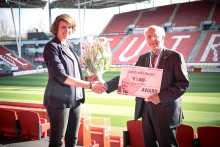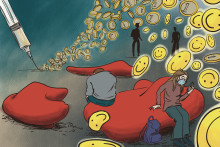Judith olde Heuvel was selected as the winner thanks to her research project on ‘Evaluation of Pelvic Organ Prolapse using upright MRI’, which she worked on as a Master’s student of Technical Medicine at the University of Twente.
‘About one third of women over 40 suffers from a pelvic organ prolapse, which means the organs in their pelvic area descend,’ the scientist explains the relevance of her work. ‘This condition induces different symptoms, such as urinary or faecal incontinence or sexual dysfunction. The patients experience most problems while standing or walking, but they are examined and diagnosed while lying down. The effect of gravity is not taken into account in this supine position.’
Olde Heuvel’s research did include this crucial effect of gravity – by employing a low-field MRI system which offers the possibility to scan the patient in an upright position. ‘I compared these MRI images with images taken in supine position and I saw a significant difference in the degree of prolapse. The influence of gravity is major and it implies that patients might have been underdiagnosed.’
These results therefore suggest to perform the examination in upright position more often in clinical practice. ‘I believe these insights are very useful, but there is currently only one of the ‘upright’ MRI scans – here at the University of Twente. So it is hard to predict if this technique will be implemented soon,’ adds Olde Heuvel, who is now an external PhD candidate at the UT, conducting her new research at Antoni van Leeuwenhoek Ziekenhuis in Amsterdam.
Professor Vooijs Award
The award is named after Peter Vooijs, the former Medical Director of the MIRA research institute and the Scientific Director of the UT’s Technical Medicine programme. It is awarded annually and includes a cash prize of 1,000 euros.
Judith olde Heuvel was chosen as the winner out of seven nominees. Apart from her, the final top three included Technical Medicine graduates Pien Spoor and Roel Verhoeven.







